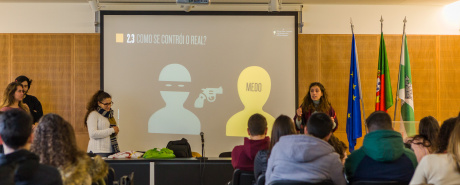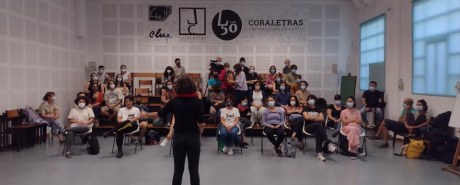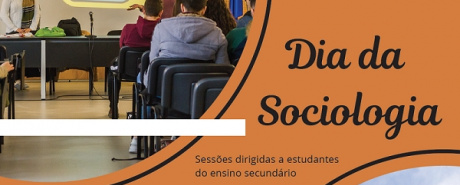
"Sociological look at the world: debates in secondary schools" is an initiative of the Portuguese Sociological Association (APS), promoted locally, since 2017, by the direction of the First Degree and Master's Degree in Sociology of the Faculty of Arts of the University of Porto; and, since 2021, with the involvement and support of IS-UP.
The initiative also involves students from the 2nd and 3rd years of the First Degree and the 1st year of the Master's, aiming to bring sociology closer to secondary school students, through peer training. In total, this activity has already covered 11 secondary schools in the north and center of the country (762 participants, including secondary school students and teachers).

The Theatre & Politics Laboratory is an initiative of IS-UP, in partnership with the association Tartaruga Falante. It has been running regularly since 2021 as a space for collective creation and experimentation. It has worked on issues such as informal care, housing crisis or job insecurity using methodologies such as the Theatre of the Oppressed, dialectical theatre, agit-prop, among others.
The Laboratory works regularly on Mondays, at Coral de Letras of the University of Porto.

The Institute of Sociology has sought to encourage dialogue with and openness to civil society and its educational, cultural, and social institutions. For this reason, the IS-UP and the Department of Sociology invite secondary schools to take part in the Sociology Day(s) every year.
The programme includes a welcome by the Executive Committee and the Department of Sociology; the viewing of institutional videos; a non-formal education session on "what is Sociology", led by undergraduate and master's degree students; a forum-theatre session on a social issue and, finally, a visit to the Faculty's premises.
In 2022, the activity will take place on 18 and 19 May, at the Faculty of Arts of the University of Porto.

The IS-UP Nucleus of the Museum of the Person is a digital repository of qualitative data, in the form of oral testimonies on various topics. Through video-recorded interviews (or just audio, if anonymity is required), it is possible to capture and disseminate life stories, creating a digital archive of oral sociology that can be used as a basis for future research and foster community intervention actions.
In this digital museum, which focuses on the voice and the stories of different social actors spread across the country and facing different social inequalities, people's life stories are the works of art to be admired and analysed by all.
The main aims of this initiative are to:
- Create a database of diverse qualitative data to be used in future sociology and other disciplinary research and interventions;
- Promote a decentralised and active dynamic of engagement with communities in the area;
- Disseminate information and knowledge in an open and transparent relationship with the wider civil society;
- Promote reflection and knowledge on different forms of social vulnerability;
- Elevate the voices and stories of people and communities in situations of social exclusion and vulnerability;
- Preserve memories, traditions and ways of life while promoting reflection on the future, in a transformative and empowering perspective.
Exhibitions:
I Exhibition. Stories of former Pejão miners - Coal mining in Portugal
II Exhibition. "Vila Flor no Feminino" - Stories of Portuguese Women in the Interior of the country
III Exhibition. (In)visible stories - People at risk of homelessness.
IV Exhibition. Lives of resistance and clandestinity in Porto

Artistic structure/Performer(s): Gil Delindro
Synopsis: A audição vibratória (Hearing the vibrations) is a public creation and exhibition initiative, in collaboration with the Porto Deaf Association. Based on four months of research, sculptures will be created using sound matter as “palpable vibrations”, shaped by volunteers from the deaf community. In addition to the final exhibition in Serralves, the initiative includes two concerts that explore the potential of using “physical vibration” to make music. The goal is to demystify the belief that the deaf are unable to perceive and interact with the plasticity of sound.
Participating investigator(s): Inês Barbosa
Project duration: 1 year (2024)
Funding institution: Porto City Council | Programa Criatório

Artistic structure/Performer(s): Magda Almeida and Miguel F
Synopsis: This project reflects on the social, psychological and relational impacts of today’s technological changes on younger generations, the first to inhabit a fully digital society. Combining dance, audiovisual media, generative algorithms, and the manipulation of organic and synthetic materials, we seek to develop a new artistic vocabulary and pathways towards raising public awareness of ethical issues emerging from this digital revolution. The creative process incorporates sociology (research methods and practices), the arts and education (workshops in a public school), and artificial intelligence (use of tools to direct and create choreographies and audio-visual management for the show). The human condition is viewed from a transhumanist perspective. Today, we do not have dirt on our shoes; the floor is covered in dead pixels that cannot be swept under the sofa.
Participating investigator(s): Inês Barbosa e Ana Cláudia Albergaria
Project duration: 1 year (2024)
Funding institution: Gulbenkian Foundation

Artistic structure/Performer(s): Dance company Esquiva - Companhia de Dança
Synopsis: Reviralho em Conversa II continues to focus on the theme utopias, myths and dreams of the Quimera project. The three sessions, scheduled to take place between October and December at Coliseu do Porto, will be held both in person and online and moderated by the Institute of Sociology of the University of Porto (IS-UP). Six investigators from FLUP and other institutions will be invited to discuss issues on the representation of dreams, myths and utopias. The purpose of this initiative is to encourage innovation and critical thinking, with documentation to enhance Esquiva’s performative repertoire.
Participating investigator(s): Inês Barbosa, João Teixeira Lopes e Cláudia Marisa
Project duration: 6 months (2023/2024)
Funding institution: DGArtes